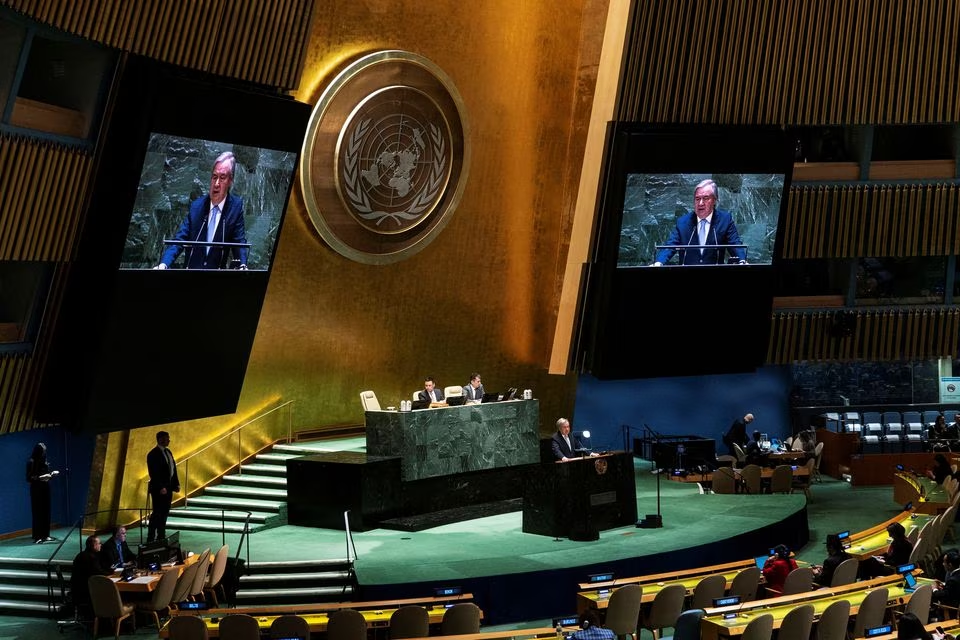The United Nations General Assembly voted on Wednesday to pass a resolution asking the world's top court to define the obligations of states to combat climate change, a legal opinion that could drive countries to take stronger measures and clarify international law.
The historic resolution seeking an advisory opinion from the International Court of Justice was inspired by Pacific island law students and passed with a consensus vote, after a four-year campaign led by the Republic of Vanuatu.
"Such an opinion would assist the General Assembly, the UN and Member States to take the bolder and stronger climate action that our world so desperately needs," UN Secretary General António Guterres said. An advisory opinion would not be binding on any jurisdiction but could influence future negotiations.
Vanuatu Prime Minister Ishmael Kalsakau said it "will have a powerful and positive impact on how we address climate change and protect present and future generations."
"Together we will send a loud and clear message not only around the world but far into the future that on this very day, the people of the UN acting through their governments decided to leave aside differences and work together to tackle the defining challenge of our time," he said before the General Assembly.
Vanuatu pushed for the resolution, leading a core group of 18 countries ranging from Costa Rica to Germany.
It could take the court around 18 months to issue an advisory opinion that could clarify financial obligations countries have on climate change; help them revise and enhance national climate plans submitted to the Paris Agreement; and strengthen domestic policies and legislation.
Vanuatu and other vulnerable countries are already grappling with powerful impacts of a heating planet. The south Pacific island nation has been slammed by powerful climate-fueled cyclones, including two this month that left 10% of its population still in evacuation centers.
Australian Foreign Minister Penny Wong said Australia was among 130 countries to co-sponsor the resolution, which was "a key example of Pacific Island leaders driving global climate action".
On the eve of the vote, Vanuatu diplomats were still trying to win support from China and the U.S., the two biggest greenhouse gas emitting countries.
The United States did not support the resolution at the General Assembly.
"We believe that diplomacy – not an international judicial process – is the most effective path forward for advancing global efforts to tackle the climate crisis," a senior Biden administration official said.
The latest report by the Intergovernmental Panel on Climate Change warned that to limit global warming to 1.5 degrees Celsius, greenhouse gas emissions must be nearly halved by 2030.
Bangladesh's foreign secretary called the resolution's passage a "defining moment" that can help bridge the gap between climate finance promises made to vulnerable countries and what is delivered.
"Despite better needs for financing, we see growing expenditure in military budgets or armaments of funding wars and conflicts or even bailing out companies during a financial crisis," he said. "We hope this resolution and consequent advisory opinion will provide a better understanding of the legal implications of climate change under international law."
The resulting advisory opinion could be a vital input to the burgeoning climate-driven lawsuits around the world. There are upwards of 2,000 cases pending worldwide.
"A decision from the ICJ could be very influential with courts around the world that are faced with the growing number of climate change cases," said Michael Gerrard, director of Columbia University's Sabin Center for Climate Change Law.
Other international courts and tribunals are also being asked to clarify and define the law around climate obligations, including the Inter-American Court of Human Rights and the International Tribunal for the Law of the Sea.
The Pacific island law students celebrated the vote, four years after they suggested an ICJ resolution to Vanuatu officials.
“We are just ecstatic that the world has listened to the Pacific Youth and has chosen to take action" on the idea that "started in a Pacific classroom four years ago," said Cynthia Houniuhi, Solomon Islands based President of Pacific Island Students Fighting Climate Change.




















































